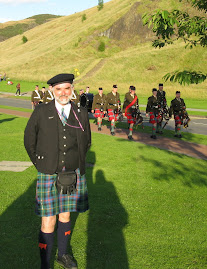 A Toast to Saint Andrew
A Toast to Saint AndrewbyJim MacGregor
Most of us have heard the legends and traditions about Saint Andrew, the patron saint of Scotland. He may have been a missionary to Scotland. Saint Regulus brought a relic of Saint Andrew to Scotland. He was martyred on an X-shaped cross. We find the facts about him, however, in the Bible. Those facts allow us to surmise something about his character, and to conclude that he is a fitting patron for the Scots.
People frequently attribute certain traits to the Scottish character:
They say a Scot is thrifty. Saint Andrew lived with his brother and the family. Maybe he did so because he was single. On the other hand, maybe he was saving his pennies. (Mk 1:29)
A Scot is thought to have an independent spirit - not bound by tradition. We know that Andrew was a follower of John the Baptist who preached against the establishment and its traditions. John was not a popular figure among the ruling class. (Jn 1:40)
We Scots are said to have an open mind and to value learning. Andrew sought an interview with the Lord to hear the gospel message first-hand. He had to determine for himself whether or not to follow Him. (Jn 1:35-40)
They say a Scot has enthusiasm and the courage of his convictions. Andrew believed the Lord. He went to his brother, Peter, and told him he had found the Messiah! He introduced Peter to the Lord. Could it be that Saint Andrew was the first domestic missionary? (Jn 1:41-42)
We all know a Scot has reserve. Andrew was one of the first four apostles. He is always mentioned with, but less frequently than, the other three. Maybe he was not part of the "inner circle" -- or perhaps he was and just did not blather about it.
Scots are said to have a metaphysical bent. Andrew was one of those who inquired of the Lord about the signs of the end times. (Mk 13:3-4)
A Scot is practical, a man of action. Andrew heard the discussion of how to feed the thousands of people. He found the boy with the five barley loaves and two fish. He directed the people to be seated. Maybe he also supervised the distribution. (Jn 6:4-11)
A Scot can be a devoted, dutiful servant. The Greeks wanted an interview with the Lord. They asked Philip. Andrew took the request to the Lord. Could Saint Andrew have been the first missionary to foreigners? (Jn 12:20-22)
A Scot is loyal. Andrew was with the others in the upper room in the scary time after the Lord's ascension. (Acts 1:12-14)
Ladies and Gentlemen, I offer a toast to a true role model for us Scots -- Saint Andrew!
© Copyright James B. MacGregor 1997


